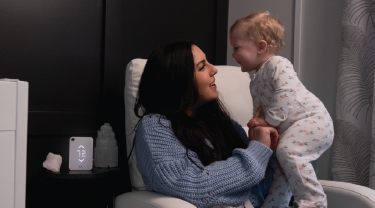
Mysa Smart Thermostats: innovation for electric heating and cooling
Mysa Smart Thermostats, based in St. John’s, NL, is an Export Development Canada 2021 Cleantech Export One-to-Watch.
In this blog:
In 2016, my brother Zach and I founded Mysa—a company that makes smart thermostats for electric baseboard heaters, air conditioners and in-floor electric heating—out of our desire to find ways to help fight climate change. I studied mechanical engineering at Dalhousie University with a focus on energy systems for heating and cooling. My professors helped me understand the gravity of climate change, including the need for energy-saving solutions.

Heating and cooling account for more than half of an average home’s energy use, making it a big opportunity to reduce energy waste. Our products can help customers reduce their energy bills from 15% to 20%.
After university, I started doing energy audits for homeowners in Newfoundland to help them increase energy efficiency. One of the biggest energy wasters I found were electric baseboard heaters, a common heating system for homes in the province. Homeowners would usually leave them on all the time because they didn’t know how to control them or were frustrated with the hard-to-use programming devices available on the market.
Nest and ecobee (a former EDC Cleantech Export Star) were the category leaders in smart thermostats and demonstrated a viable market for these products, but they only worked with furnaces. Like Apple, those companies created beautiful devices that were easy to use, but there weren’t any similar devices for electric baseboard heaters. To address this unserved niche, we created a sleek and easy-to-use smart thermostat that can be programmed and controlled remotely through an app on your smartphone. Mounted on the wall or set on a table, the compact thermostat can be regulated from wherever you are—even from halfway across the world.
We began our product launch journey by participating in a number of entrepreneurship incubator programs for start-up companies in Atlantic Canada. The incubators were crucial to our success, helping us develop a plan to get the company going and connect us with the experts and resources we needed.
Participating in incubators, like Memorial University’s Genesis Centre and Propel ICT, allowed us to determine the size and location of the baseboard heating market in Canada and the United States. We learned there are roughly 10 million homes with baseboard heating—half in Canada and half in the U.S. In Canada, most are in Quebec and British Columbia. In the U.S., they’re concentrated in New England in the east and Washington and Oregon in the west. Not surprisingly, since we launched the product in 2018, our annual sales have been split between those regions.
The ecosystem of support for Canadian entrepreneurs was important at every step as we developed our product and built the company. My brother, father and I put $30,000 of our own money into the business in those early days, but that wasn’t enough to hire software and electrical engineers to build the product. We leveraged that initial money through the National Research Council Canada Industrial Research Assistance Program (NRC IRAP), which tripled our funds, allowing us to hire people to do important R&D work.
In 2016 and 2017, the Business Development Bank of Canada (BDC) also helped us with a $50,000—later $75,000—business loan that we used for everything from getting our product certified to purchasing materials and other initial manufacturing costs.
As we developed the product, we conducted market research to determine our go-to-market strategy. We decided to launch as an e-commerce business first. We built a website to showcase the product, explain its value proposition and take pre-orders before we’d even started manufacturing. Like a crowdfunding campaign, we took credit card numbers, but didn’t charge people until we were ready to ship. The website was supported with an ad campaign on Google and Facebook to target people searching for smart thermostats and baseboard heating.
Our first pre-order came on Christmas Eve 2016. We eventually pre-sold $700,000 worth of thermostats before shipping our first products in March 2018. The traction we demonstrated through the pre-order campaign attracted our first venture capital investment in 2017. That funding enabled us to hire the people we needed and start working with a manufacturing partner. We’ve now grown beyond strictly e-commerce sales and have recently signed deals with large retailers, like Best Buy and Home Depot.
Since the beginning, our relationship with Export Development Canada (EDC) has been key. EDC’s overall expertise, advice and networks have been extremely valuable for everything from helping us better understand export markets to dealing with supply chain issues.
EDC also explained how we could finance inventory purchases, a challenge for any start-up company. They worked with our bank to guarantee our line of credit, enabling us to purchase needed surplus inventory before the start of each heating season.
We also relied on EDC Credit Insurance to protect our receivables for our international sales. For example, a purchase order for 1,000 thermostats from an energy efficiency contractor in the U.S. would have been too risky for us. We can’t afford not to get paid for an order that size. With credit insurance, we are able to mitigate those risks. EDC’s financial support has helped our business grow quickly. In 2020, EDC became an investor through the Investment Matching Program, enabling us to launch new products.
Electric baseboard heating is not used extensively outside of North America, so there isn’t a big international demand for our first product. For our second product, Mysa for In-Floor (or under-floor) heating, we immediately saw a stronger international appetite—from Europe and China to Australia.
Our third product, Mysa for Air Conditioners, is the one we’re most excited about. It was inspired by customers who told us they want to control their home cooling and heating, all through one app. Additionally, there’s a huge market for air conditioning in Europe, the Middle East and Asia. We spent two years developing our product and launched it this summer. We’ve already sold 4,000 units across Canada and the U.S.
The product also works with a mini-split heat pump, a ductless air conditioner that also heats. As countries around the world look for ways to reduce greenhouse gas emissions through greater energy efficiency, we think systems, like the mini-split heat pump, controlled by our product, can play a large role. Next year, we’ll be launching Mysa for Air Conditioners in Australia, using a similar market strategy used to launch our first product: e-commerce and then retail.
Lessons learned
The pandemic created challenges for every business, especially manufacturing companies, like ours, that rely on global supply chains, which were severely disrupted by COVID-19. Our vice-president of operations responded by developing different defence layers in our supply chain strategy. For example, working with our manufacturing partner in China to start using an additional manufacturing facility in another country. We’ve also found more dynamic means of directing our inventory from the manufacturing facility to North America. Formerly, our product followed a single path from our facility to the Port of Vancouver. Now, we have different ways to transport our product to different ports.
Solving complicated issues, like these, requires outside experts. When we were building the company, what we needed most was a network of people we could turn to for advice. I’m now passionate about giving back to other entrepreneurs. I participate in Slack chats and network with peer groups of companies that build hardware to give them as much advice as possible. One thing I encourage them to do is leverage the supply chains and manufacturing partners in Asia—sooner rather than later. It’s not as daunting as they think, and working with a great partner can accelerate their business.

















